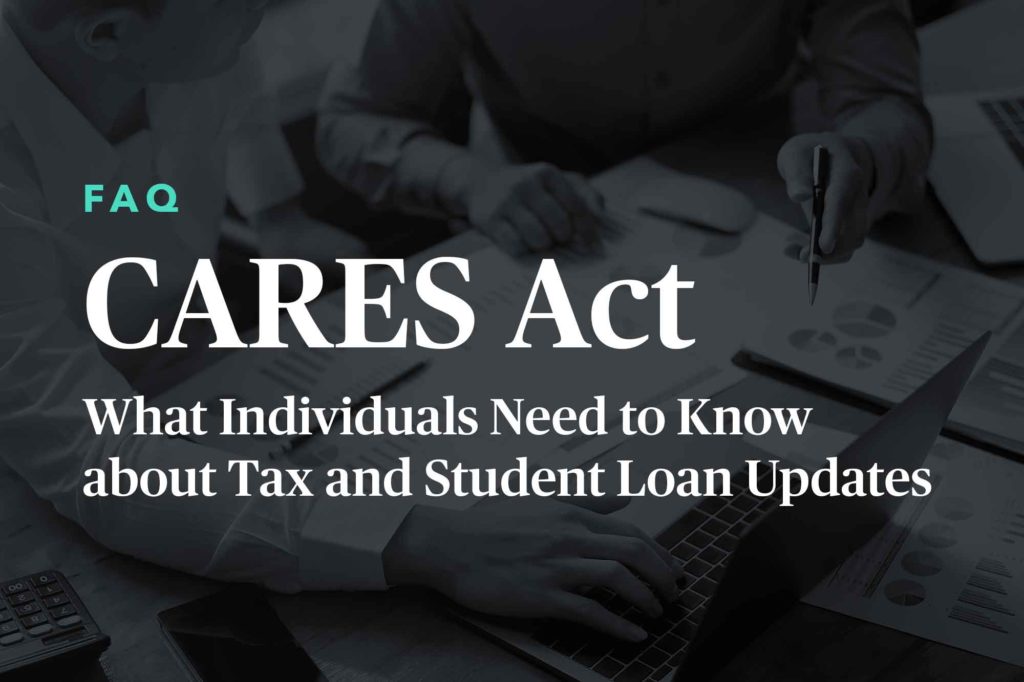
Summary
This guide explores the broad-ranging financial assistance offered to individuals under Congress’ $2.2 trillion Coronavirus Aid, Relief, and Economic Security (CARES) Act—including direct tax rebates of up to $1,200 per person, student-loan repayment deferrals, and protection for those who are temporarily unable to pay their rent or mortgage.
On June 3, 2020, the Paycheck Protection Program Flexibility Act (PPPFA) of 2020 was signed into law to give borrowers additional time and flexibility to use the Paycheck Protection Program (PPP) loan proceeds. Please refer to this link for updates on the PPP program as of June 3, 2020.

CARES Act delivers rebates, deferrals, and protections during COVID-19 crisis
Congress’ $2.2 trillion Coronavirus Aid, Relief, and Economic Security (CARES) Act includes an array of financial assistance for individuals affected by the COVID-19 crisis. This Guide is a recap of the second episode of our three-webinar series on the CARES Act, which explored how this massive relief package will bring direct tax rebates of up to $1,200 per person and protections for those who are temporarily unable to pay their rent or mortgage.
Jeremiah Barlow, Head of Family Wealth Services at Mercer Advisors, and Kara Duckworth, our Managing Director of Client Experience, also spelled out the CARES Act’s student-loan repayment deferral option, added incentives for charitable giving, and increased unemployment compensation. We’ve summarized the highlights from their April 8 webinar below. You can also replay the presentation along with our other CARES Act webinars in the Mercer Advisors Resource Center.
OVERVIEW
Components of the CARES Act package aimed at helping individual Americans:
- Recovery rebate. Eligible individuals and households are expected to receive a federal income tax credit payment by mail or direct deposit around April 17, 2020.
- Student loan repayment deferral. Payments can be paused through September 30, 2020 without penalties or accrued interest.
- Increased deductions for charitable gifts. Taxpayers who make cash donations equaling up to 100% of their adjusted gross income (AGI) to public charities in 2020 can claim the full amount as a tax deduction. Also, any taxpayer can deduct $300 of charitable giving without having to itemize deductions on their 2020 tax return.
- Mortgage and rent relief. Homeowners with federally backed mortgages are protected against foreclosure through May 17, 2020 and renters living in properties with federally owned mortgages cannot be evicted for non-payment of rent through June 24, 2020.
- Unemployment compensation increase. Those who qualify for unemployment will receive an extra $600 per week, beyond the regular weekly benefit under their state’s law, from April 5, 2020 through July 31, 2020. They also can receive unemployment for up to 39 weeks, rather than the 26-week limit imposed by many states.
Also, note that the Federal tax deadline has been extended. 2019 income tax returns and payments are now due July 15 instead of the usual April 15 deadline. For individuals and businesses that need to pay 2020 estimated taxes, the first quarterly installment deadline is extended until at least June 15.
RECOVERY REBATE DETAILS
What is this payment?
It’s a one-time tax rebate, classified as a credit against your 2020 federal income tax liability. The rebate will not be counted as taxable income.
Do I qualify?
If you filed an income tax return for 2018 or 2019, you should receive this rebate.
How much will I receive?
It depends on your Adjusted Gross Income (AGI) for either 2019, if you’ve already filed a return this year, or for 2018. Here is a breakdown:
- $1,200 — single filers and heads of household with an AGI under $75,000 (single) or $112,500 (head of household)
- $2,400 — joint filers with an AGI under $150,000
- $500 — additional rebate for each qualifying dependent child, subject to the AGI thresholds above
If your AGI is higher than these thresholds, the rebate amounts decrease by $50 for every additional $1,000 of income reported on your tax return. It phases out entirely at $99,000 for single taxpayers with no children and $198,000 for joint taxpayers with no children.
The Tax Foundation, an independent tax policy nonprofit, has posted an interactive CARES Act Rebate Calculator at https://taxfoundation.org/federal-coronavirus-relief-bill-cares-act/#1.
What if my actual AGI for 2020 puts me at a different threshold than what the IRS has used to calculate this rebate?
According to the Tax Foundation website, “taxpayers eligible for a larger rebate based on 2020 income will receive it in the 2020 tax season. Taxpayers with higher incomes in 2020 will see the overpayment associated with their rebate forgiven.”
“For example, a single taxpayer with $100,000 in 2019 income would not receive an advance rebate but would receive the $1,200 credit on their 2020 return if their income for the year fell below the phaseout. On the other hand, a single taxpayer with $35,000 in income receives a $1,200 advance rebate but would not have to pay the rebate back on the 2020 return if they make $100,000 this year.”
STUDENT LOAN REPAYMENTS DEFERRAL
Does my student loan qualify?
The CARES Act deferral applies only to the Federal Family Education Loan (FFEL) program and direct Federal Perkins loans owned by the U.S. Department of Education. However, student-loan borrowers who are not eligible for the CARES Act deferral should still contact their lender to inquire about other deferral options that may be offered.
How long can I wait to make a payment?
Qualifying loan payments are deferred from March 13, 2020 – September 30, 2020. You will need to change any automatic payments that may be scheduled.
How else does the CARES Act help student loan payers?
Deferral will have no impact on your credit score, and no interest will accrue on the loan amount during this time. Involuntary debt collections are also suspended through September 30, 2020. Also, if you already have delinquent student loans, your 2019 tax refund will come to you instead of being applied toward delinquent loan payments if you file your tax return before the end of the deferral period.
As another perk of the CARES Act, employers that offer tuition reimbursement can now also apply that benefit—up to a combined $5,250 total—toward an employee’s student loan debt through the end of 2020.
Should I continue making my scheduled payments anyway?
If you can afford to do so comfortably, the full amount of any payments made between now and September 30, 2020 will be credited toward your loan principal. That means you’ll be able to pay off the loan faster and reduce the amount of interest charged.
CHARITABLE GIVING
What incentives did the CARES Act create?
Previously, the maximum allowable federal income tax deduction for cash donations to a public charity was 60% of the taxpayer’s AGI. Congress raised that allowable deduction to 100% of AGI to encourage more support for nonprofits that are involved in COVID-19 crisis relief efforts. However, the IRS’ previously established deduction limits still apply for charitable donations to private foundations and donor-advised funds.
What is the $300 “above the line” deduction?
You can claim a tax deduction of up to $300 in 2020 for contributions to a qualifying charity or nonprofit, regardless of whether you itemize your deductions or choose to file a standard (non-itemized) federal income tax return.
MORTGAGE AND RENT RELIEF
What additional protections did the CARES Act create?
Homeowners with mortgages backed by the federal programs commonly known as Fannie Mae and Freddie Mac cannot be foreclosed upon for at least 60 days following the CARES Act passage. Homeowners can also request forbearance on mortgage payments for at least 180 days by contacting their lender. The CARES Act also imposed a halt of at least 120 days on eviction proceedings for non-payment of rent against renters living in single-family and multifamily properties with federally backed mortgages.
What if my mortgage, or my landlord’s, isn’t federally backed?
Some other lenders, as well as a number of states, are providing similar relief options. Check with your loan servicer and state housing authority for details.
WHAT TO DO NEXT
Your financial advisor and tax preparer can help you determine which CARES Act assistance options you qualify to receive. They can also help you assemble the necessary documents and answer questions about how to apply for benefits.
How can I stay up to date on the evolving CARES Act details?
Mercer Advisors is posting frequent updates about the CARES Act and other coronavirus-related topics on our “Insights for Navigating Recent Events” Resource Center: https://insight.merceradvisors.com/Coronavirus-Markets-Resource-Center.
Mercer Advisors Inc. is the parent company of Mercer Global Advisors Inc. and is not involved with investment services. Mercer Global Advisors Inc. (“Mercer Advisors”) is registered as an investment advisor with the SEC. The firm only transacts business in states where it is properly registered, or is excluded or exempted from registration requirements. All expressions of opinion reflect the judgment of the author as of the date of publication and are subject to change. Some of the research and ratings shown in this presentation come from third parties that are not affiliated with Mercer Advisors. The information is believed to be accurate, but is not guaranteed or warranted by Mercer Advisors. Content, research, tools, and stock or option symbols are for educational and illustrative purposes only and do not imply a recommendation or solicitation to buy or sell a particular security or to engage in any particular investment strategy. For financial planning advice specific to your circumstances, talk to a qualified professional at Mercer Advisors. Past performance may not be indicative of future results. Therefore, no current or prospective client should assume that the future performance of any specific investment, investment strategy or product made reference to directly or indirectly, will be profitable or equal to past performance levels. All investment strategies have the potential for profit or loss. Changes in investment strategies, contributions or withdrawals may materially alter the performance and results of your portfolio. Different types of investments involve varying degrees of risk, and there can be no assurance that any specific investment will either be suitable or profitable for a client’s investment portfolio. Historical performance results for investment indexes and/or categories, generally do not reflect the deduction of transaction and/or custodial charges or the deduction of an investment-management fee, the incurrence of which would have the effect of decreasing historical performance results. Economic factors, market conditions, and investment strategies will affect the performance of any portfolio and there are no assurances that it will match or outperform any particular benchmark. This document may contain forward-looking statements including statements regarding our intent, belief or current expectations with respect to market conditions. Readers are cautioned not to place undue reliance on these forward-looking statements. While due care has been used in the preparation of forecast information, actual results may vary in a materially positive or negative manner. Forecasts and hypothetical examples are subject to uncertainty and contingencies outside Mercer Advisors’ control. Mercer Advisors is not a law firm and does not provide legal advice to clients. All estate planning documentation preparation and other legal advice is provided through its affiliation with Advanced Services Law Group, Inc.

